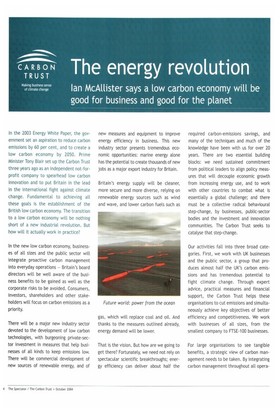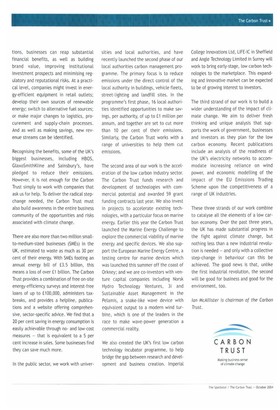The energy revolution
Ian McAllister says a low carbon economy will be good for business and good for the planet
In the 2003 Energy White Paper, the government set an aspiration to reduce carbon emissions by 60 per cent, and to create a low carbon economy by 2050. Prime Minister Tony Blair set up the Carbon Trust three years ago as an independent not-forprofit company to spearhead tow carbon innovation and to put Britain in the lead in the international fight against climate change. Fundamental to achieving all these goals is the establishment of the British low carbon economy. The transition to a low carbon economy will be nothing short of a new industrial revolution. But how will it actually work in practice?
In the new low carbon economy, businesses of all sizes and the public sector will integrate proactive carbon management into everyday operations — Britain's board directors will be well aware of the business benefits to be gained as well as the corporate risks to be avoided. Consumers, investors, shareholders and other stakeholders will focus on carbon emissions as a priority.
There will be a major new industry sector devoted to the development of low carbon technologies, with burgeoning private-sector investment in measures that help businesses of all kinds to keep emissions low. There will be commercial development of new sources of renewable energy, and of new measures and equipment to improve energy efficiency in business. This new industry sector presents tremendous economic opportunities: marine energy alone has the potential to create thousands of new jobs as a major export industry for Britain.
Britain's energy supply will be cleaner, more secure and more diverse, relying on renewable energy sources such as wind and wave, and lower carbon fuels such as gas, which will replace coal and oil. And thanks to the measures outlined already, energy demand will be lower.
That is the vision. But how are we going to get there? Fortunately, we need not rely on spectacular scientific breakthroughs; energy efficiency can deliver about half the required carbon-emissions savings, and many of the techniques and much of the knowledge have been with us for over 20 years. There are two essential building blocks: we need sustained commitment from political leaders to align policy measures that will decouple economic growth from increasing energy use, and to work with other countries to combat what is essentially a global challenge; and there must be a collective radical behavioural step-change, by businesses, public-sector bodies and the investment and innovation communities, The Carbon Trust seeks to catalyse that step-change.
Our activities fall into three broad categories. First, we work with UK businesses and the public sector, a group that produces almost half the UK's carbon emissions and has tremendous potential to fight climate change. Through expert advice, practical measures and financial support, the Carbon Trust helps these organisations to cut emissions and simultaneously achieve key objectives of better efficiency and competitiveness. We work with businesses of all sizes, from the smallest company to FTSE-100 businesses.
For large organisations to see tangible benefits, a strategic view of carbon management needs to be taken. By integrating carbon management throughout all opera tions, businesses can reap substantial financial benefits, as well as building brand value, improving institutional investment prospects and minimising regulatory and reputational risks. At a practical level, companies might invest in energy-efficient equipment in retail outlets; develop their own sources of renewable energy; switch to alternative fuel sources; or make major changes to logistics, procurement and supply-chain processes. And as well as making savings, new revenue streams can be identified.
Recognising the benefits, some of the UK's biggest businesses, including HBOS, GlaxoSmithKline and Sainsbury's, have pledged to reduce their emissions. However, it is not enough for the Carbon Trust simply to work with companies that ask us for help. To deliver the radical stepchange needed, the Carbon Trust must also build awareness in the entire business community of the opportunities and risks associated with climate change.
There are also more than two million smallto-medium-sized businesses (SMEs) in the UK, estimated to waste as much as 30 per cent of their energy. With SMEs footing an annual energy hill of £3.5 billion, this means a loss of over £1 billion. The Carbon Trust provides a combination of free on-site energy-efficiency surveys and interest-free loans of up to £100,000, administers taxbreaks, and provides a helpline, publications and a website offering comprehensive, sector-specific advice. We find that a 20 per cent saving in energy consumption is easily achievable through noand low-cost measures — that is equivalent to a 5 per cent increase in sales. Some businesses find they can save much more.
In the public sector, we work with univer
sities and local authorities, and have recently launched the second phase of our local authorities carbon management programme. The primary focus is to reduce emissions under the direct control of the local authority in buildings, vehicle fleets, street-lighting and landfill sites. In the programme's first phase, 16 local authorities identified opportunities to make savings, per authority, of up to £1 million per annum, and together are set to cut more than 10 per cent of their emissions. Similarly, the Carbon Trust works with a range of universities to help them cut emissions.
The second area of our work is the acceleration of the low carbon industry sector. The Carbon Trust funds research and development of technologies with commercial potential and awarded 59 grant funding contracts last year. We also invest in projects to accelerate existing technologies, with a particular focus on marine energy. Earlier this year the Carbon Trust launched the Marine Energy Challenge to explore the commercial viability of marine energy and specific devices. We also support the European Marine Energy Centre, a testing centre for marine devices which was launched this summer off the coast of Orkney; and we are co-investors with venture capital companies including Norsk Hydro Technology Ventures, 3i and Sustainable Asset Management in the Pelamis, a snake-like wave device with equivalent output to a modern wind turbine, which is one of the leaders in the race to make wave-power generation a commercial reality.
We also created the UK's first low carbon technology incubator programme, to help bridge the gap between research and development and business creation. Imperial College Innovations Ltd, LIFE-IC in Sheffield and Angle Technology Limited in Surrey will work to bring early-stage, tow carbon technologies to the marketplace. This expanding and innovative market can be expected to be of growing interest to investors.
The third strand of our work is to build a wider understanding of the impact of climate change. We aim to deliver fresh thinking and unique analysis that supports the work of government, businesses and investors as they plan for the low carbon economy. Recent publications include an analysis of the readiness of the UK's electricity networks to accommodate increasing reliance on wind power, and economic modelling of the impact of the EU Emissions Trading Scheme upon the competitiveness of a range of UK industries.
These three strands of our work combine to catalyse all the elements of a low carbon economy. Over the past three years, the UK has made substantial progress in the fight against climate change, but nothing less than a new industrial revolution is needed — and only with a collective step-change in behaviour can this be achieved. The good news is that, unlike the first industrial revolution, the second will be good for business and good for the environment, too.
Ion McAllister is chairman of the Carbon Trust.



















































































































 Previous page
Previous page